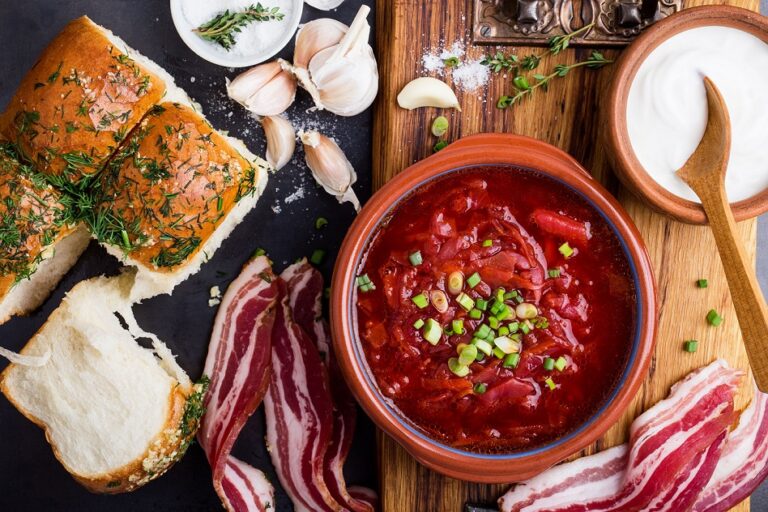Introduction: What is Russian cuisine?
Russian cuisine is a diverse and flavorful culinary tradition that has developed over centuries. Due to its geographical and cultural diversity, Russian cuisine is characterized by a wide range of ingredients, flavors, and cooking techniques. Generally, Russian cuisine is known for its hearty and filling dishes, which are designed to keep people warm and well-fed during the long, cold winters.
The Role of History in Russian Cuisine
Like many other cuisines, Russian cuisine has been shaped by the country’s history and cultural influences. For centuries, the harsh climate and limited access to fresh ingredients forced Russian cooks to rely on preserved and pickled foods. This led to the development of traditional techniques, such as salting, smoking, and fermenting, which are still used today.
Russian cuisine has also been influenced by its neighbors, including the Mongols, Tatars, and Turks. These cultural exchanges led to the introduction of new ingredients, such as lamb, rice, and spices. Additionally, the Soviet era brought about changes in food production and distribution, which affected the availability of certain ingredients and led to the standardization of some dishes.
Common Ingredients in Russian Dishes
Despite its diversity, Russian cuisine features several common ingredients that are used in many traditional dishes. These include potatoes, cabbage, beets, carrots, onions, garlic, and sour cream. Meat is also an essential component of Russian cuisine, with beef, pork, lamb, and chicken being the most popular choices. Fish, particularly salmon and sturgeon, are also commonly used ingredients, especially in dishes from northern and eastern regions.
Other common ingredients in Russian cuisine are grains, such as rye and barley, which are used to make bread and porridge. Buckwheat is another popular grain that is often used in savory dishes. Finally, mushrooms and berries are also commonly used in Russian cuisine, especially in the summer and fall months when they are in season.
Traditional Russian Dishes to Try
There are countless traditional Russian dishes to try, each with its own unique flavor and history. Some of the most iconic dishes include borscht, a hearty beet soup; pelmeni, small meat-filled dumplings; blini, thin pancakes usually served with caviar or sour cream; and shashlik, marinated kebabs typically made with lamb or pork. Other popular dishes include beef stroganoff, a creamy beef dish served with noodles; golubtsy, cabbage rolls filled with meat and rice; and pirozhki, small stuffed buns filled with meat, vegetables, or cheese.
Regional Variations in Russian Cuisine
Russian cuisine varies greatly between regions, each with its own unique culinary traditions. For example, northern regions, such as Karelia and Murmansk, are known for their seafood dishes, while southern regions, such as the Caucasus, are known for their spicy and flavorful dishes. Additionally, due to the country’s vast size, there are regional variations in ingredients and flavors. For example, dishes from Siberia often feature game meats, such as reindeer or elk, while dishes from the Volga region often feature fish and stews.
The Future of Russian Cuisine: Modernization and Globalization
As Russia becomes more connected to the global community, its cuisine is also changing and evolving. Modern chefs are experimenting with traditional ingredients and techniques, while also incorporating international flavors and trends. Additionally, the rise of food tourism and the popularity of Russian cuisine abroad is prompting a renewed interest in traditional dishes and ingredients.
Despite these changes, traditional Russian cuisine remains an important part of the country’s cultural identity and is an essential component of family gatherings, celebrations, and national holidays. As such, Russian cuisine is likely to continue to evolve, while also remaining grounded in its rich cultural heritage.

